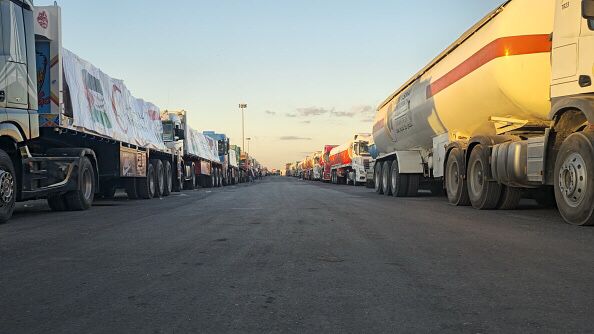Chandrayaan-2 Observes Sun’s Impact on Moon’s Thin Atmosphere
Rafah Border to Stay Closed as Israel and Hamas Accuse Each Other of Ceasefire Breach
Jerusalem, October 19, 2025
The Rafah border crossing between Gaza and Egypt will remain closed until further notice, Israeli Prime Minister Benjamin Netanyahu announced on Saturday. He said that the crossing would only reopen once Hamas hands over the remaining bodies of deceased Israeli hostages. The decision came as Israel and Hamas continued to exchange accusations over violations of the U.S.-mediated ceasefire.
Earlier, the Palestinian embassy in Egypt had said the Rafah crossing — the main exit point for Gazans — would reopen on Monday for those entering Gaza. However, Netanyahu’s announcement contradicted this, signaling that Israel’s conditions had not yet been met.
In Washington, the U.S. State Department said it had received credible intelligence suggesting an “imminent ceasefire violation” by Hamas. It claimed Hamas was preparing an attack on Palestinian civilians in Gaza, which would be a “direct and grave violation” of the truce. The statement added that the U.S. would take steps to protect civilians and maintain the ceasefire if such an attack occurred.
Former President Donald Trump, who brokered the ceasefire deal, said earlier that Israel could resume military operations in Gaza if Hamas failed to comply with the agreement. Hamas has not commented on the latest allegations.
Reports from Gaza suggest that Hamas has tightened control in areas vacated by Israeli forces. There have been public executions and clashes with armed local groups, signaling a tense and unstable environment.
In a response to Israel’s move, Hamas said Netanyahu’s decision to keep Rafah closed “violates the ceasefire agreement” and breaks promises made to mediators. The group said the closure would block the entry of equipment needed to recover more bodies of hostages from beneath the rubble, delaying their handover.
Israel confirmed on Saturday that it had received two additional bodies, bringing the total to 12 out of 28 expected under the U.S.-brokered ceasefire and hostage exchange deal.
The ongoing dispute has worsened the humanitarian crisis in Gaza, where nearly all residents have been displaced and famine-like conditions persist. Hospitals are overwhelmed, and aid deliveries remain insufficient despite a gradual increase since the ceasefire began.
As part of the agreement, Hamas released 20 living Israeli hostages who had been held for two years, in exchange for nearly 2,000 Palestinian detainees. The deal also requires Israel to return 360 bodies of Palestinian militants in exchange for the deceased Israeli hostages. So far, Israel has returned 15 bodies for each Israeli body received.
The Rafah crossing has been largely closed since May 2024. Although aid shipments have increased, the 560 metric tons of food entering daily fall short of what is needed, according to the UN World Food Programme.
Major challenges remain to achieving lasting peace under Trump’s 20-point plan. Key issues — including Hamas’s disarmament, governance of Gaza, and the creation of an international stabilization force — remain unresolved. The road to a permanent solution continues to be fraught with political, military, and humanitarian obstacles.
Rafah Border Remains Closed Amid Israel-Hamas Tensions
Israel has announced that the Rafah border crossing between Gaza and Egypt will stay closed until Hamas hands over the remaining bodies of Israeli hostages. Prime Minister Benjamin Netanyahu said reopening depends on Hamas fulfilling its commitments under the ceasefire deal. The U.S. has accused Hamas of planning a new attack, calling it a serious breach of the truce. Hamas, however, blames Israel for violating the agreement by blocking aid and delaying body recoveries. The closure worsens Gaza’s humanitarian crisis, where food shortages and displacement continue despite the ceasefire and ongoing international mediation efforts.














Add Comment